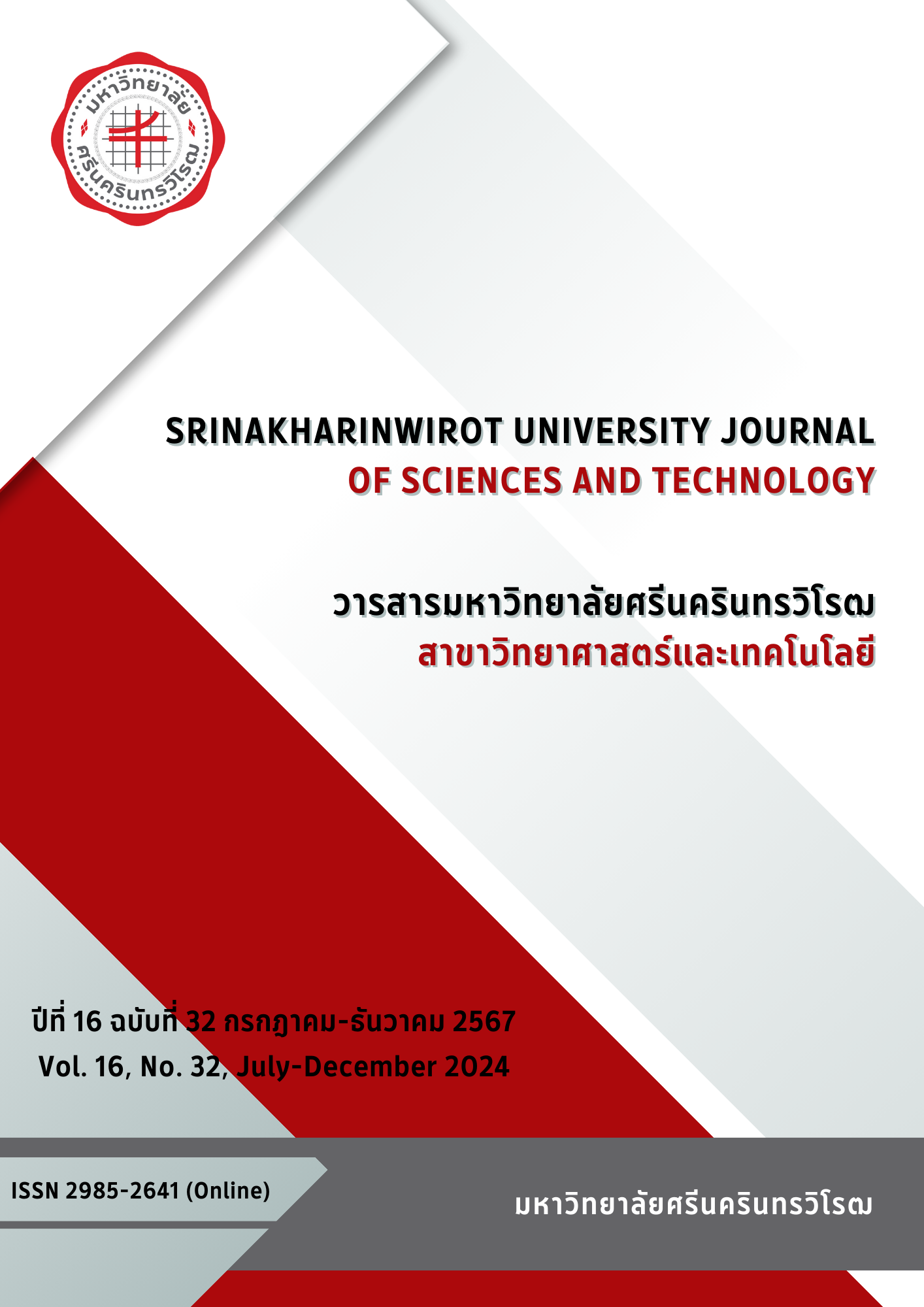PREDICTION OF CARBON DIOXIDE EMISSION FROM ENERGY CONSUMPTION IN THAILAND WITH SARIMA-ANN-REG MODEL
Keywords:
Forecasting, Carbon Dioxide, Box-Jenkins, Artificial Neural Networks, Hybrid ModelAbstract
This study aims to forecast monthly CO2 emissions in Thailand using data from the Ministry of Energy using the model SARIMA-ANN-REG. Using linear regression model combined both SARIMA and Artificial Neural Network (ANN) approaches. Monthly CO2 emission data from January 2015 to December 2022 (96 months) as the training dataset, while data from January to July 2023 (7 months) was used for forecasting. The model selection was based on minimizing the root mean square error (RMSE). The result found that the SARIMA-ANN-REG model with SARIMA(1,0,2)(1,1,1)12 and the 8 hidden nodes in the ANN component, achieving an RMSE of 0.4992 on the training set. Applied to the forecasting period, the model yielded an RMSE of 1.2106 with the forecast model is
where ,
,
are the forecast value, forecast value using SARIMA mode and forecast value with ANN model at time, respectively.
Downloads
References
Pitoonpong, S. (2021). Global warming and labor. Matichon Online. Retrieved August 1, 2023, from https://www.matichon.co.th/columnists/news_3037715
The Energy Policy and Planning Office. (2022). Energy statistics. Retrieved August 1, 2023, from https://www.eppo.go.th/index.php/en/en-energystatistics/co2-statistic
Boonmana, C., and Kulvanich, N. (2017). A Comparative prediction accuracy of hybrid time series models. Thai Science and Technology Journal, 25(2), 177-190. https://li01.tci-thaijo.org/index.php/tstj/article/view/70308/57090
Nyoni, T., and Bonga, W. G. (2019). Prediction of co2 emissions in India using Arima models. DRJ-Journal of Economics & Finance, 4(2), 01-10. https://ssrn.com/abstract=3346378
Amphanthong, P. (2022). Comparison of methods for analysis of the air quality: A case study of alternative energy for biogas in suphanburi province. Journal of Applied Research on Science and Technology (JARST), 21(1), 44-54. https://doi.org/10.14456/jarst.2022.5
Sala-ngam, S. (2022). Towards a predictor for CO2 emission using regression analysis and an artificial neural network. The Journal of Industrial Technology: Suan Sunandha Rajabhat University, 10(2). 54-65. https://ph01.tci-thaijo.org/index.php/fit-ssru/article/view/248813
Kulvanich, N. (2020). Improving Prediction Accuracy of Time Series Data Using ARIMA-ANN Hybrid Model and Regression Analysis. Thai Science and Technology Journal, 28(12), 2101-2112. https://li01.tci-thaijo.org/index.php/tstj/article/view/210424/170099
Devadoss, A. V., and Ligori, T. A. A. (2013). Forecasting of stock prices using multi-layer perceptron. International journal of computing algorithm, 2(1), 440-449.
Li, W., Han, M., and Wang, J. (2020). Recurrent restricted Boltzmann machine for chaotic time-series prediction. In 2020 12th International Conference on Advanced Computational Intelligence (ICACI) (pp. 439-445). The Institute of Electrical and Electronics Engineers (IEEE).
Krishnan, G., Mehta, K. B. V., and Yadav, R. S. (2022). Assessment of future pattern of rainfall in different zones of Kerala using incorporation of SARIMA, ANN, and hybrid SARIMA-ANN models. Economic Affairs (New Delhi), 67(5), 823-832.
Abdullah, A. S., Ruchjana, B. N., and Jaya, I. G. N. M. (2021). Comparison of SARIMA and SVM model for rainfall forecasting in Bogor city, Indonesia. Journal of Physics: Conference Series, 1722(1), Article number 012061.
Downloads
Published
How to Cite
Issue
Section
License
Copyright (c) 2024 Srinakharinwirot University Journal of Sciences and Technology

This work is licensed under a Creative Commons Attribution-NonCommercial-NoDerivatives 4.0 International License.
Srinakharinwirot University Journal of Sciences and Technology is licensed Under a Creative Commons Attribution-NonCommercial-NoDerivs 4.0 International (CC-BY-NC-ND 4.0) License, Unless Otherwise Stated. Please Read Journal Policies Page for More Information on Open Access, Copyright and Permissions.



